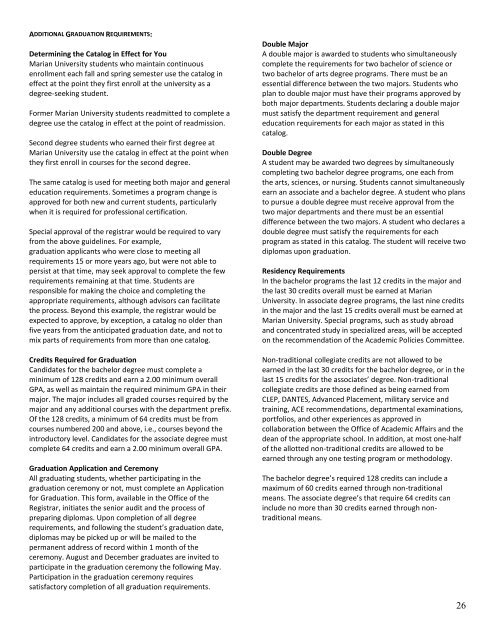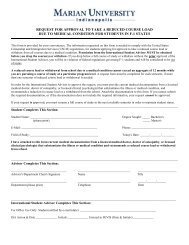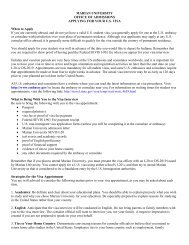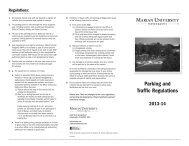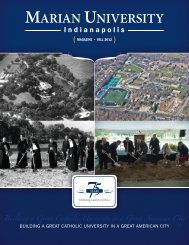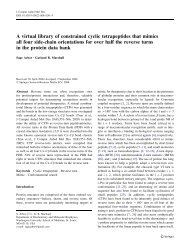2009-11 Marian University Course Catalog, fall 2010 edition
2009-11 Marian University Course Catalog, fall 2010 edition
2009-11 Marian University Course Catalog, fall 2010 edition
You also want an ePaper? Increase the reach of your titles
YUMPU automatically turns print PDFs into web optimized ePapers that Google loves.
ADDITIONAL GRADUATION REQUIREMENTS:<br />
Determining the <strong>Catalog</strong> in Effect for You<br />
<strong>Marian</strong> <strong>University</strong> students who maintain continuous<br />
enrollment each <strong>fall</strong> and spring semester use the catalog in<br />
effect at the point they first enroll at the university as a<br />
degree-seeking student.<br />
Former <strong>Marian</strong> <strong>University</strong> students readmitted to complete a<br />
degree use the catalog in effect at the point of readmission.<br />
Second degree students who earned their first degree at<br />
<strong>Marian</strong> <strong>University</strong> use the catalog in effect at the point when<br />
they first enroll in courses for the second degree.<br />
The same catalog is used for meeting both major and general<br />
education requirements. Sometimes a program change is<br />
approved for both new and current students, particularly<br />
when it is required for professional certification.<br />
Special approval of the registrar would be required to vary<br />
from the above guidelines. For example,<br />
graduation applicants who were close to meeting all<br />
requirements 15 or more years ago, but were not able to<br />
persist at that time, may seek approval to complete the few<br />
requirements remaining at that time. Students are<br />
responsible for making the choice and completing the<br />
appropriate requirements, although advisors can facilitate<br />
the process. Beyond this example, the registrar would be<br />
expected to approve, by exception, a catalog no older than<br />
five years from the anticipated graduation date, and not to<br />
mix parts of requirements from more than one catalog.<br />
Credits Required for Graduation<br />
Candidates for the bachelor degree must complete a<br />
minimum of 128 credits and earn a 2.00 minimum overall<br />
GPA, as well as maintain the required minimum GPA in their<br />
major. The major includes all graded courses required by the<br />
major and any additional courses with the department prefix.<br />
Of the 128 credits, a minimum of 64 credits must be from<br />
courses numbered 200 and above, i.e., courses beyond the<br />
introductory level. Candidates for the associate degree must<br />
complete 64 credits and earn a 2.00 minimum overall GPA.<br />
Graduation Application and Ceremony<br />
All graduating students, whether participating in the<br />
graduation ceremony or not, must complete an Application<br />
for Graduation. This form, available in the Office of the<br />
Registrar, initiates the senior audit and the process of<br />
preparing diplomas. Upon completion of all degree<br />
requirements, and following the student’s graduation date,<br />
diplomas may be picked up or will be mailed to the<br />
permanent address of record within 1 month of the<br />
ceremony. August and December graduates are invited to<br />
participate in the graduation ceremony the following May.<br />
Participation in the graduation ceremony requires<br />
satisfactory completion of all graduation requirements.<br />
Double Major<br />
A double major is awarded to students who simultaneously<br />
complete the requirements for two bachelor of science or<br />
two bachelor of arts degree programs. There must be an<br />
essential difference between the two majors. Students who<br />
plan to double major must have their programs approved by<br />
both major departments. Students declaring a double major<br />
must satisfy the department requirement and general<br />
education requirements for each major as stated in this<br />
catalog.<br />
Double Degree<br />
A student may be awarded two degrees by simultaneously<br />
completing two bachelor degree programs, one each from<br />
the arts, sciences, or nursing. Students cannot simultaneously<br />
earn an associate and a bachelor degree. A student who plans<br />
to pursue a double degree must receive approval from the<br />
two major departments and there must be an essential<br />
difference between the two majors. A student who declares a<br />
double degree must satisfy the requirements for each<br />
program as stated in this catalog. The student will receive two<br />
diplomas upon graduation.<br />
Residency Requirements<br />
In the bachelor programs the last 12 credits in the major and<br />
the last 30 credits overall must be earned at <strong>Marian</strong><br />
<strong>University</strong>. In associate degree programs, the last nine credits<br />
in the major and the last 15 credits overall must be earned at<br />
<strong>Marian</strong> <strong>University</strong>. Special programs, such as study abroad<br />
and concentrated study in specialized areas, will be accepted<br />
on the recommendation of the Academic Policies Committee.<br />
Non-traditional collegiate credits are not allowed to be<br />
earned in the last 30 credits for the bachelor degree, or in the<br />
last 15 credits for the associates’ degree. Non-traditional<br />
collegiate credits are those defined as being earned from<br />
CLEP, DANTES, Advanced Placement, military service and<br />
training, ACE recommendations, departmental examinations,<br />
portfolios, and other experiences as approved in<br />
collaboration between the Office of Academic Affairs and the<br />
dean of the appropriate school. In addition, at most one-half<br />
of the allotted non-traditional credits are allowed to be<br />
earned through any one testing program or methodology.<br />
The bachelor degree’s required 128 credits can include a<br />
maximum of 60 credits earned through non-traditional<br />
means. The associate degree’s that require 64 credits can<br />
include no more than 30 credits earned through nontraditional<br />
means.<br />
26


